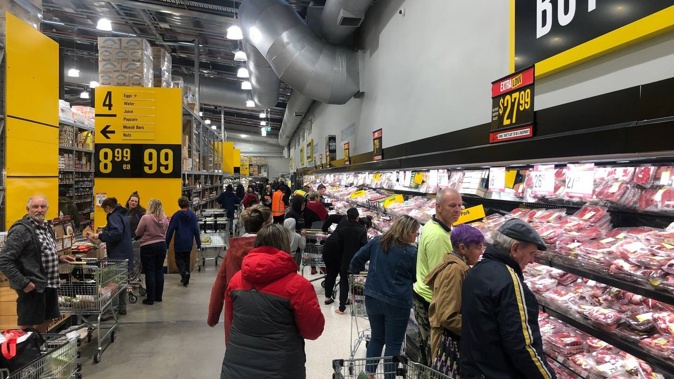
Kiwi retailers want to bring in a coordinated and “sector-wide” use of facial recognition technology in a bid to catch criminals, a new report says.
Sector lobby group Retail NZ is worried retail crime is becoming more widespread with criminals being “increasingly organised, brazen and violent” and having a sense that they “will get away with it”.
It found 92 per cent of the 297 businesses it surveyed in its latest Retail Crime in NZ report had been affected by crime in the past year, up from 81 per cent in the 2017 survey.
It estimates this costs $2.6 billion annually, saying much of this flows through to the prices customers pay.
Retail NZ wants stronger punishments for criminals, greater co-operation with police and other crime-prevention groups and more training for retail workers.
It also wants to use artificial intelligence to identify customers who have previously committed crimes, although the report does not make it clear whether it wants businesses to be allowed to share customer data with each other or not.
“Creating a sector-wide approach to the use of facial recognition and other proactive technologies to identify a person who has previously committed retail crime” is listed as one of Retail NZ’s key aims.
Crime has become a hot political issue ahead of October 14′s General Election.
/cloudfront-ap-southeast-2.images.arcpublishing.com/nzme/HNL325INMFHGXJI2VAZOSG3QZQ.jpg) Retail lobby group wants sector-wide use of AI-powered facial recognition technology.
Retail lobby group wants sector-wide use of AI-powered facial recognition technology.
It has been dominating headlines with record numbers of ram raids, a high-profile tragedy involving home detention, Oranga Tamariki rooftop protests, and fighting at a youth justice facility.
But while the issue of whether crime it is going up or down is nuanced, as explained in this Herald Inform your vote guide, Retail NZ said it is a huge issue that puts retail employees and customers at risk.
Last November, Foodstuffs North Island, which owns New World, Pak’nSave and Four Square supermarkets, confirmed it was trialling facial recognition in 29 stores.
A month earlier hardware chain Bunnings and mass retailer Kmart denied using facial recognition in New Zealand after it was found they had been using the technology in Australia.
Customer lobby group Consumer NZ said at the time it was “seriously concerned” shopping Kiwis were having their sensitive biometric data collected and analysed without knowing it.
Retail NZ’s new report, meanwhile, said police data showed almost 120,000 crimes had been committed in retail outlets and service stations in the past year, a 115 per cent jump in six years.
Police data also showed 760 ramraids had been reported to police in the 12 months to August 2023, a sixfold increase on six years ago, Retail NZ said.
The biggest cost from the crimes was stolen goods, costing about $1.35b or 53 per cent of the total annual cost.
Of that, employees and suppliers are estimated to each year be stealing or ripping off about $250 million from retailers.
Shoplifting and burglary-type crimes account for the other $1.1b of stolen goods.
Retailers are then estimated to have to spend another $1.1b annually on costs such security cameras, guards, insurance and damage to property.
A further $73m is estimated to be spent of staff wellbeing, such as training and counselling services.
Shoplifting is the most common crime experienced by retailers, with 82 per cent of the 297 businesses surveyed saying they had experienced it in the past year.
Fifty-one per cent had had criminal damage, 37 per cent robbery and 23 per cent physical violence or assault.
While most serious crimes were reported to police, only 41 per cent of shoplifting was and 39 per cent of criminal damage and 19 per cent of threatening behaviour was .
Just 22 per cent of thefts or fraud by employees and suppliers were reported.
Retail NZ said overall “aggression, violence and other retail crimes are getting worse”.
It believes the increase is being driven by organised crime, people stealing to fund addiction and young people trying to gain notoriety on social media.
Other reasons Retail NZ cites are not enough police resources to support retailers, clogged courts with some criminals reoffending before being tried for earlier offences and the high cost of living.
Retail NZ wants more police and court funding, better programmes to support child offenders and stronger laws to protect retail workers.
Take your Radio, Podcasts and Music with you









